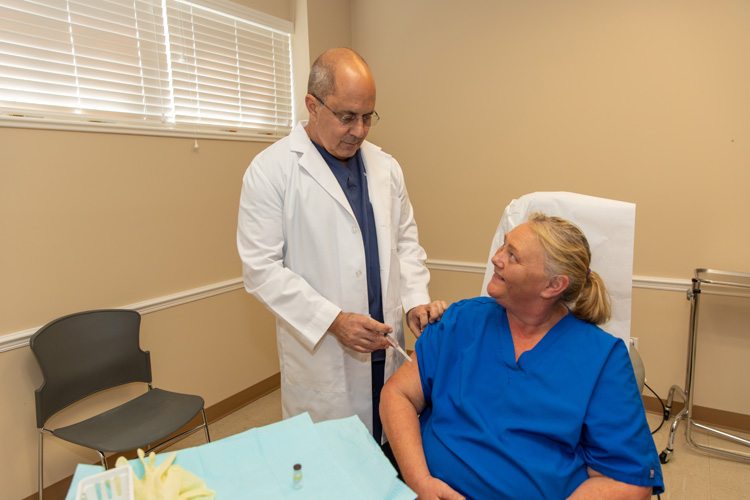
Can an existing vaccine approved for another purpose be used to cure one or more types of skin cancer, including squamous cell carcinomas and basal cell carcinomas?
Dr. Tim Ioannides of Treasure Coast Dermatology thinks it can and he says there are many other physicians, including Dr. Anna J. Nichols of the Department of Dermatology and Cutaneous Surgery at the University of Miami’s Miller School of Medicine, who agree with him.
If what Ioannides and Nichols postulate in true, it could be huge news, since “squamous cell carcinoma is the second most common form of skin cancer and its incidence is increasing,” according to the National Institutes of Health.
According to Ioannides, “there is three to four times as much skin cancer now as when I graduated from medical school about 20 years ago, and it seems this isn’t just being caused by sun — because people aren’t getting that much more sun.
“I’m sort of a numbers guy,” Ioannides continues, “and it looked like an infectious disease curve to me, like there was an infection that was propagated [that is causing the increase in skin cancer]. If it was an infection, what was causing that infection?”
Nichols and loannides, along with eight other researchers, looked into what that infection might be and have had two papers published in the Journal of the American Medical Association Dermatology so far (more are in the pipeline) in which they identify the infection, discuss treatment with an existing vaccine, and cite some seemingly impressive treatment results.
According to the published papers, the skin cancers named above may be caused by the human papillomavirus, or HPV, and the vaccine being used for treatment is Gardasil 9.
But pump the brakes on this a bit.
So far, it is not settled science that Gardasil 9 cures squamous cell carcinomas or basal cell carcinomas.
While NIH does say “mounting evidence suggests that HPV [a virus with subtypes that cause diseases in humans ranging from common warts to cervical cancer] is involved in the pathogenesis of certain squamous cell carcinomas,” it does not endorse the use of the HPV vaccine in treating those cancers.
The use of the FDA-approved Gardasil 9 for squamous cell tumors is an “off-label” use, and more research – including clinical trials with good outcomes – is needed before Gardasil 9 becomes the treatment of choice for these skin cancers.
But Ioannides believes he is on the right track.
One of the papers he and his associates published in JAMA Dermatology cites a 97-year-old woman “whose right leg was covered with squamous cell tumors.” The tumors went away after she was treated with Gardasil 9.
Ioannides also tried the drug on his father-in-law, “who was having some skin cancers and we had some good effects.”
“Then with appropriate consents,” he continues, “I talked to some patients who were having lot of skin cancers – and I have hundreds of patients who’ve had more than 20 or 30 skin cancers – and said, ‘look, this might work, do you want to try it?’
“We gave them the vaccine and I noticed that tumors were regressing on a lot of them. Probably about 70 percent.”
That said, Ioannides pauses briefly and adds, “One of the questions we are asked is, how does it work? And we have to say, really, we don’t know.”
If you suffer from squamous cell carcinoma or basal cell carcinoma, talk to your oncologist before seeking the “off-label” use of any medication or vaccine.
Dr. Tim Ioannides is with Treasure Coast Dermatology. He has offices at 801 Wellness Way, Suite 103 in Sebastian as well as other Treasure Coast locations. The phone number in Sebastian is 772-388-1740.
Dr. Anna Nichols, lead author of the JAMA Dermatology studies, is with the Department of Dermatology and Cutaneous Surgery at the University of Miami’s Miller School of Medicine. The phone number is 1-305-243-6704.



